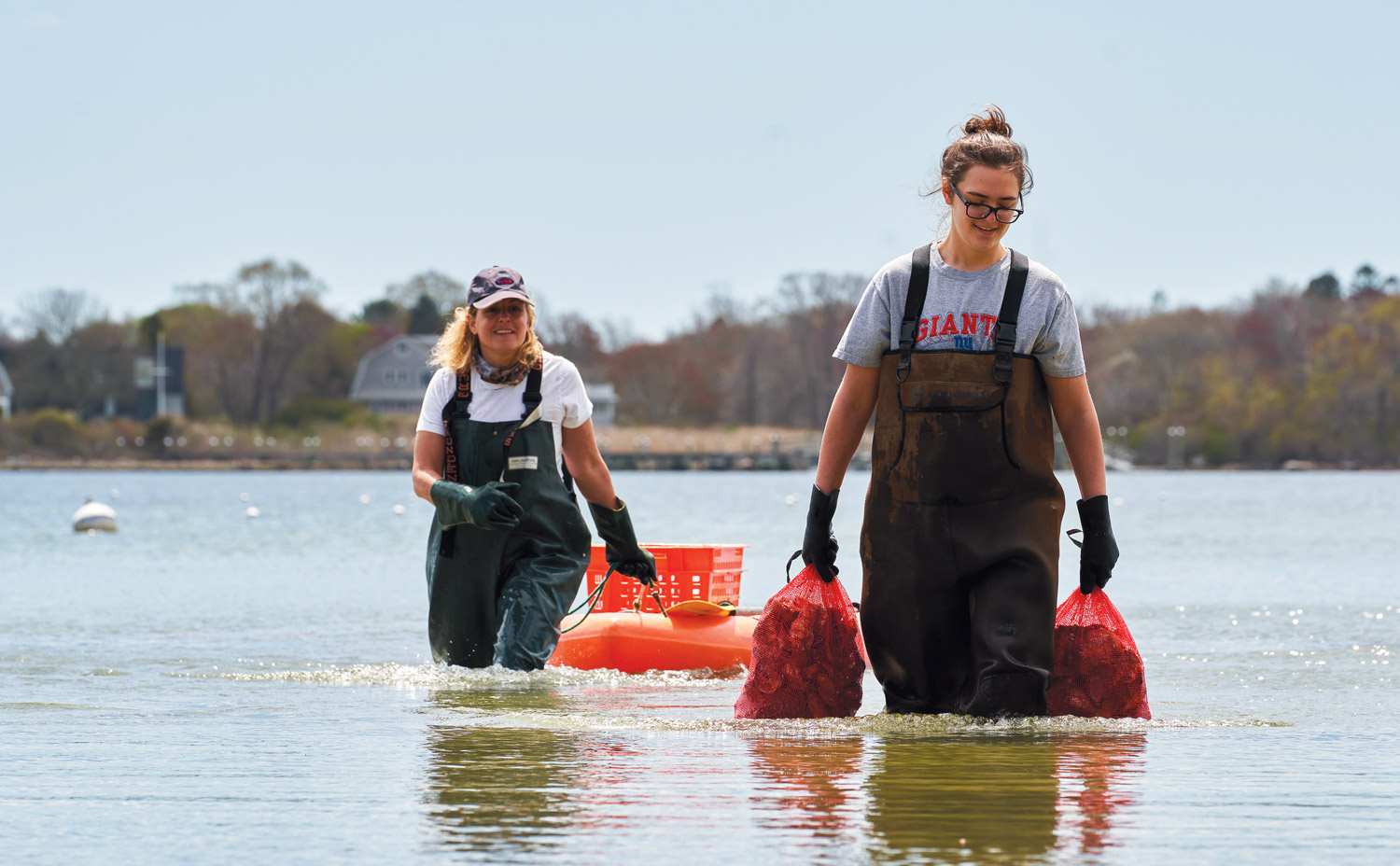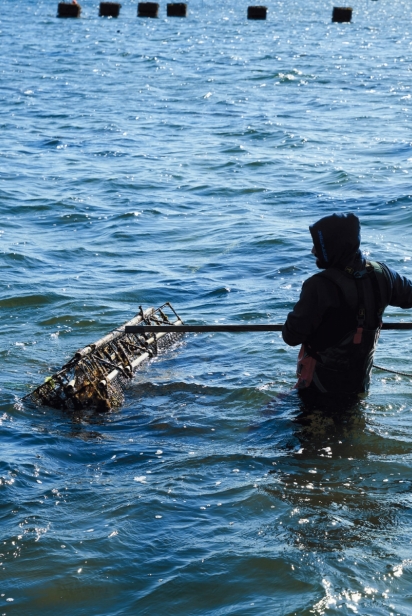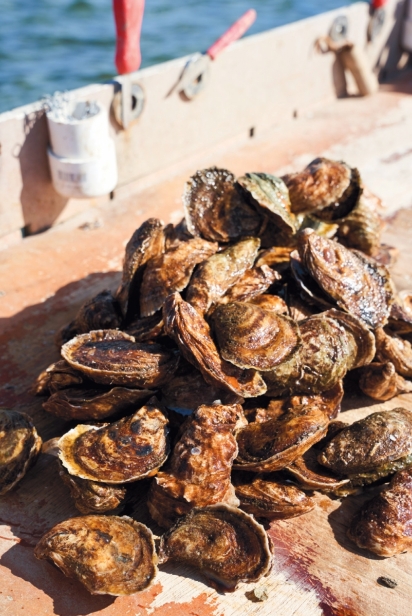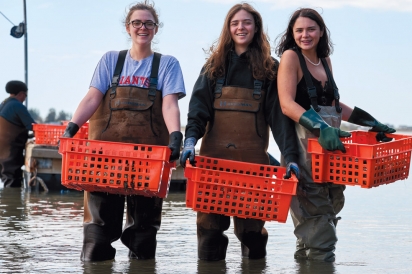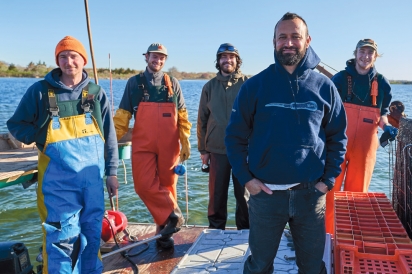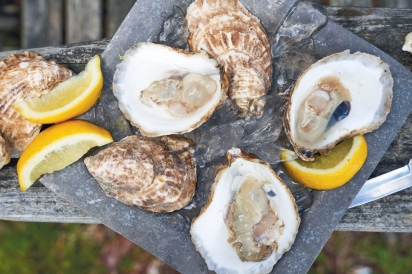Tested and Triumphant: Ocean State Oyster Farming
Winners in the Shell Game
As Jennifer Scappatura ambles back to shore gripping a bright orange basket filled with market-bound mollusks, her sun-kissed hair—tucked less-than-neatly under a faded ball cap—brushes her face in the early morning breeze. With a long day ahead, she has work on her mind: plucking, packing and hauling the morning harvest to restaurants and wholesalers as quickly as possible.
With saltwater beads trickling down her chest-high Grundens bibs and wet sand caking her muck boots, you’d hardly guess that, in a former life, Scappatura was a style editor working in the heart of New York City. But when she speaks about her love of oyster farming, despite the challenges of the global pandemic that plunged her entire industry into deep uncertainty, it’s clear she’s exactly where she’s supposed to be.
Exactly how catastrophic was last year? A survey of large dealers and wholesalers conducted by the East Coast Shellfish Growers Association following the economic shutdown determined the market for oysters declined by a whopping 98%.
In Rhode Island, Scappatura and other local growers watched as their livelihoods came to a screeching halt. “The year of the pandemic was going to be our big year,” says Scappatura, who bought a huge amount of seed oysters two years ago to make 2020 a banner year. She runs the “tide-to-table” Quonnie Siren Oyster Co. with the help of her three college-age daughters: Isabel (19) and twins Norah and Sophie (18), who, when not in school, are hard at work alongside their mother.
Scappatura learned the ins and outs of aquaculture under the tutelage of Jules Opton-Himmel, owner of Walrus & Carpenter Oysters. His first lease was six salty acres in Charlestown’s Ninigret Pond and, in 2016, he started harvesting from his two-acre farm in Jamestown’s Dutch Harbor.
“I thought [the pandemic] was going to hurt demand, but I didn’t think it was going to be as dramatic as it was, and drop as quickly as it did. Then in March, my sales went down by 80 to 90%,” concedes Opton-Himmel. “I had a little bit of panic.”
His first concern, apart from his family’s health and safety, was his staff. In a cruel twist of fate, Opton-Himmel was on track to double his work force with new hires set to start work in April. He rounded up his employees and laid things out straight: Income was nonexistent, the business had fixed expenses to cover and there were only a few months of reserves to cover paychecks. “I said, ‘We’re either going to have to go on unemployment, or be creative and come up with a solution.’ And they said, ‘We’re definitely up for this and we’re going to make it work.’ That was very inspiring,” says Opton-Himmel, taking a moment to catch his breath. “It was a really great moment for us, a bond that we had each other’s back.”
Being creative meant experimenting with new ways to garner sales. Because of Rhode Island’s unique connections shared among farmers, fishermen and food producers, it didn’t take long for folks to activate. One of Opton-Himmel’s first calls was to Patrick McNiff of Pat’s Pastured, who had a home delivery system in place. They formed a collaborative with Sweet & Salty Farm and Wishing Stone Farm, both in Little Compton, along with Robin Hollow Farm in Saunderstown, to provide direct-to-consumer seafood, meat, cheese, produce and flowers. Within a week, they were making 200 deliveries across the Ocean State, some in Opton-Himmel’s truck, also offering scallops and clams made available through his shoremen’s network. He also made new commercial customers, including Dave’s Marketplace—Rhode Island’s largest independent grocery chain.
Walrus & Carpenter went from selling 375 oysters a week at the start of the pandemic to their normal 6,000 a week in a little over a month. “I was really proud of that, and we kept everyone employed,” says Opton-Himmel.
Scappatura’s Quonnie Siren Oyster Co., named affectionately after South County’s deepest, coldest and briniest salt pond where she raises her oysters, survived with support from the Rhode Island Farm Service Agency, a division of the USDA, along with the state’s Coastal Resources Management Council. “There were a lot of programs to help us basically not go out business,” she says.
Today, both farms, along with many other local oyster farms, have returned to pre- Covid sales levels—or are exceeding them. Opton-Himmel said he’s seeing a substantial spike in demand, which he attributes to vaccinated people gaining the confidence to return to restaurants. The first week of May, for example, sales were up 76% compared to 2019—before the pandemic became our reality. He’s expecting even better numbers with his Walrus & Carpenter Oyster Bar and Farm Store in Jamestown, an oyster shack that debuted last summer with a simple menu and picnic table seating just steps from the farm.
Scappatura, who launched Quonnie Siren Oyster Co. with her debut briny bivalve, Quonnie Sirens, known for a deep cup and palate-pleasing salinity, is expanding her business.
Quonnie Golds, launching this summer, will be a much larger oyster; an homage, she says, to the “golden age” of oysters. They’re meatier with a creamy finish. She’s also diversifying by starting to grow bay scallops. “We’re all really excited about it,” Scappatura says with elation in her voice.
Much of the past year and a half, and not just for farmers, was like the oyster itself: It starts off in a vulnerable position, facing uncontrollable stresses from the outside, yet somehow, its shell grows and hardens. It’s a tough little organism that gets tossed and tumbled, but nevertheless, it persists, and the oyster flourishes, revealing its remarkable resiliency.
For more, visit QuonnieSirenOysters.com and WalrusAndCarpenterOysters.com.


